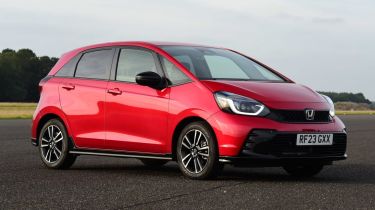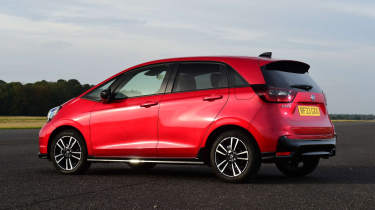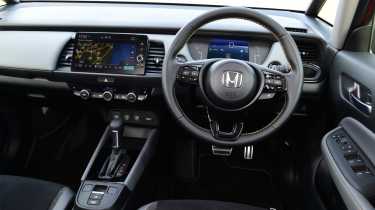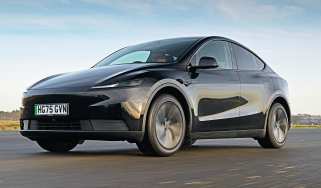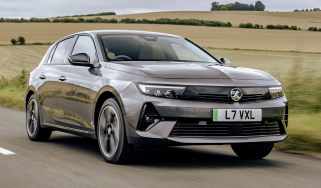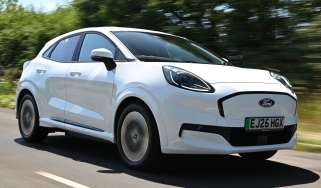Used Honda Jazz (MK4, 2020-date) review: a reliable supermini with plenty of space
A full used buyer’s guide on the Honda Jazz covering the Jazz Mk4 that’s been on sale since 2020
Verdict
There are many people who wouldn’t even consider a Honda Jazz, because of its image as a model that appeals only to elderly drivers who see their car as an appliance. If you’re one of them, then you won’t be convinced that a Jazz is worth a second thought. But if you’re in the market for a vehicle that’s as reliable as they come, is far more practical than a car this size should be, and which is easy if rather unrewarding to drive, then the Jazz could be just the car for you. In a three-way Auto Express test with the Renault Clio and Skoda Fabia, the Jazz came last. But when we pitched a Crosstar edition against a Toyota Yaris Cross, the Honda came out ahead. So while the Jazz is likeable, some of its competitors are even more so.
Honda has always put engineering first. Ever since its early efforts, such as the S500 from 1963, the Japanese firm has found ingenious solutions to automotive problems and we’ve been treated to some brilliant products as a result.
But Honda went off the boil around the turn of the millennium, with many of its cars overshadowed by rivals. Then came the original Jazz in 2001 and things started to look up. With its neat monobox design and brilliant interior packaging, it set a new standard for usability, and one which has continued to the Mk4 Jazz that arrived almost two decades after the original. Incidentally, Honda did sell a Jazz city car back in the eighties, so strictly speaking this is the fifth-generation model, but it’s the fourth generation of its kind.
History
The Jazz Mk4 hit UK roads in spring 2020 with only a petrol/electric hybrid powertrain that blended a 96bhp 1.5-litre non-turbo petrol engine with a 108bhp electric motor. These generated a combined 253Nm of torque, which was sent to the front wheels via a continuously variable automatic transmission; there was no manual option.
Used - available now
At launch there were three trim levels – SE, SR and EX – but by January 2023 these had switched to Elegance, Advance and Advance Sport. There was also a Crosstar EX, which became the Crosstar Advance in 2023. This had black plastic wheelarch and sill extensions, plus a slightly raised ride height. But don’t think you’ll be tackling any tricky terrain, because the Crosstar sits just 3cm higher than the regular Jazz.
Which one should I buy?
With only one powertrain and transmission, you don’t have many decisions to make; it’s just a case of picking the ideal colour and trim for your Jazz. The launch trim levels weren’t quite so generously equipped, so the three earlier grades don’t correspond with the later ones; the SE came on steel wheels for example, but no fourth-generation Jazz is short on standard kit.
Even the entry-level Elegance trim has heated front seats, 15-inch alloy wheels, climate control, a rear camera and rear parking sensors, plus a nine-inch touchscreen. Advance adds 16-inch alloys, privacy glass, a heated steering wheel, Apple CarPlay and Android Auto, plus navigation. The Advance Sport has adjustable driving modes and sportier exterior details, plus aluminium trim.
Alternatives to the Honda Jazz
There are more mild-hybrid or full-hybrid superminis than you might think. Two of the best are the Toyota Yaris and Renault Clio, both of which are well worth a closer look. The Suzuki Swift and Suzuki Ignis also feature mild-hybrid set-ups, and Ford offered a mild-hybrid Fiesta for a while, but only with a manual gearbox.
The third-generation Hyundai i20 is also a mild hybrid, but if you’re not worried about having electrification there are lots of other small cars to consider. The Skoda Fabia and SEAT Ibiza share much with the Volkswagen Polo, while the Peugeot 208 shares the same platform as the Vauxhall Corsa. Also put the Citroen C3, Kia Rio and now-defunct Nissan Micra on your shortlist; none of these lead the class, but they might be just what you’re looking for.
What to look for
Trims
Honda added an EX Style trim to the range in 2021. It differed only cosmetically from the EX; there was no extra kit fitted.
Economy
Honda claims that 60mpg is possible with the Jazz. Some owners have seen more than 70mpg, but 55mpg is more typical in mixed use.
Warranty
Despite Honda’s reputation for reliability, it only provides a three-year warranty on the Jazz. The hybrid powertrain is covered for five years.
Spare wheels
All Jazzes come with a tyre-repair kit rather than a spare wheel. There’s no spare-wheel well, but some owners carry a spare in the boot.
Reliability
Ever since the original model arrived, the Jazz has been regarded as one of the most dependable cars available at any price. Our latest Driver Power survey and owners’ forums suggest that nothing has changed with the fourth-generation car.
Interior
Many of Honda’s recent dashboards have been rather uninspiring with their design, but the Jazz is a step in the right direction, especially where the infotainment is concerned. It looks more modern and works really well, and the same goes for the digital instrumentation.
Some of the materials feel a bit cheap and seat comfort could be better, although the overall ambience is pretty good. Where the Jazz really scores is with its versatile and roomy cabin, including the cinema-style Magic Seats, which have been a feature since the first-generation model; they boost versatility significantly. At 304 litres, the boot is spacious; drop the back seats down and this capacity rises to 1,205 litres.
Prices
High-mileage Jazzes are rare on the used market; most have yet to breach the 30,000-mile mark, but there is the odd example that’s covered 80,000-90,000 miles. There are a lot more Crosstar EXs for sale than there are Crosstar Advances (the former has been on sale for far longer). The most common trim available on the used market is EX, followed by Crosstar EX and then SR.
To check prices on a specific model head over to our valuation tool.
Running costs
All fourth-generation Jazzes need to be serviced every 12 months or 12,500 miles. The first maintenance is an oil change and a check-over, which is priced at £285. The second service costs £505 and adds a gearbox oil change, along with fresh pollen and air filters. The third check-up is pegged at £335, and this includes fresh oil for the engine and transmission, plus a check-over of the Honda’s key functions.
From a Jazz’s third birthday it’s eligible for discounted maintenance, with services alternating between Minor and Major, priced at £240 and £350 respectively. The second one includes fresh brake fluid, although this only requires replacing every three years.
The coolant should be replenished after 10 years or 125,000 miles, then every five years or 62,500 miles thereafter, at a cost of £130. All Jazz engines are chain driven, so there are no cambelts to replace.
Recalls
Honda has an enviable reputation when it comes to recalls for the Jazz, with only one issued for the Mk4 so far. That came in August 2022 because 15,464 cars left the factory with faulty software that could lead to some of the driver-assistance systems not working properly. The vehicles affected were made between January 2020 and January 2021, when Covid was causing havoc with car production. The solution was to install new software.
Impressively, the Jazz Mk3 has been recalled only once so far, but the Mk1 and Mk2 versions have been the subject of 14 campaigns, some of which affected both generations. Many of these recalls were because of the high-profile Takata airbag problems, in which occupants could be injured by the airbags in a collision, rather than being protected by them.
Driver Power owner satisfaction
The Jazz made its Driver Power debut in the 2023 New Car survey, in 32nd place out of 75 models; it was the only Honda to appear. Encouragingly, the highest scores were for reliability, interior packaging and versatility, while quality, servicing costs and fuel economy were further high points. But owners weren’t impressed by the dynamics, while front- seat comfort and performance were also marked down.

